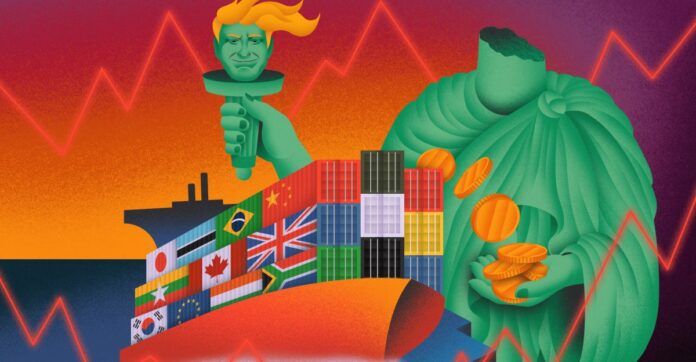The Impact of Trump’s Tariffs on the US Economy
The first 100 days of the second Trump presidency have been marked by unprecedented actions, leaving many to wonder if the US is heading towards a billionaire-helmed fascist regime. One of the most significant concerns is the implementation of steep tariffs on almost every country on Earth, resulting in economic instability.
The Effects of Tariffs on Trade and Business
Trump’s tariffs are not a traditional trade policy, but rather a means to extract benefits from trade partners and US companies. The recent tariff truces with Canada and Mexico demonstrate that these deals do not have to be substantial, as much of what Canada agreed to do had already been announced prior. This approach has created a culture of constant tariff anxiety among US trading partner countries, private businesses, and individuals, particularly those who are not ultra-wealthy.
The Uncertainty of Tariffs
The extreme fluctuations between "tariffs on," "tariffs off," and "tariffs somewhere in between" have led to a state of uncertainty, making it difficult for businesses and individuals to prepare. Influencers and public figures are advising people to stock up on products that may be affected by tariffs, while billionaires are sounding the alarm and then quickly backing down. The threat of tariffs has become a MAGA buzzword, used as a solution for perceived wrongs against the US.
The Impact on Everyday People
In recent months, there have been numerous reports of people buying up everyday items before tariffs take effect, including Italian olive oil, teas, skincare and makeup products, expensive electronics, clothing, and more. Social media platforms are filled with people sharing their large purchases, trying to anticipate what they’ll need that may increase in price. However, even the preparations that everyday people can make are a gamble, as tariffs shift day to day and week to week.
The Gamble of Preparing for Tariffs
For instance, someone who uses Korean skincare products may need to adjust their strategy depending on whether they’re getting taxed 25 percent or 10 percent. The uncertainty of tariffs also makes for a good marketing tactic, with small businesses receiving emails from suppliers suggesting they stock up on components before prices inevitably rise. The email from a magnet supplier reads, "Don’t wait, act now to avoid paying more later."
The Effects on Businesses
Trump’s tariffs have thrown a wrench into every business’s supply chain, from giant corporations like Nintendo and Apple to small brands making personal care products and clothing. While big tech companies were initially silent on the issue, some of the most transparent businesses have been the ones with the most to lose but the least power to change the hand they were dealt. These include the American denim brand worried about getting products into overseas markets, the indie cosmetics company warning of knock-on effects to the industry, or the sexual wellness brand adding a "Trump tariff surcharge" to customers’ shopping carts.
Small Businesses Speak Out
Dame, the sexual wellness company, wrote on its site, "By naming the surcharge, we hope to spark more conversations around how economic policies affect the things we use, love, and rely on. And most importantly, how they affect the small, mission-driven businesses trying to create change." Small operations like Dame likely have little chance of getting a meeting with the President to grovel for tariff exceptions.
The Backlash from Billionaires
Even billionaire supporters of Trump have begun to express concerns about the tariffs. JPMorgan Chase CEO Jamie Dimon initially backed Trump’s tariffs but later warned that they increased the chance of a recession. Bill Ackman, a billionaire hedge fund investor who endorsed Trump, exhibited early signs of a crash-out on social media, saying it was "not what we voted for" despite broad tariffs being one of Trump’s marquee campaign promises.
Conclusion
The Trump administration’s use of tariffs as a weapon has created a state of uncertainty and anxiety among businesses and individuals. The effects of tariffs will be severe, changing how Americans shop and how and what American companies produce. Consumers, especially low-income people, will likely be the first to feel the impact when their cheap imports skyrocket in cost. The only constant seems to be that everyone else gets squeezed, as the administration continues to wield tariffs as a means to extract benefits and advance their political agenda.

